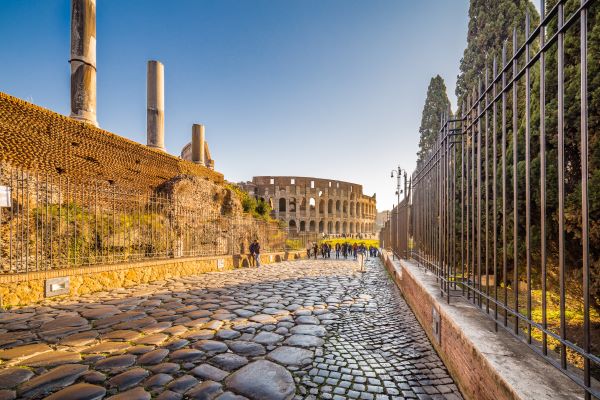Roman Road?
By Jim Huskins
McDowell County
The parallels between modern America and ancient Rome are striking. Both empires enjoyed military and cultural dominance—for a while. Both advanced engineering and infrastructure development to levels previously unknown. Both cultures eventually descended into moral chaos. Rome’s moral cataclysm led to its destruction.
One of Rome’s accomplishments was a marvelous network of roadways. At the peak of their power, Rome’s vast empire was served by more than fifty thousand miles of roads. That massive public works project is worthy of study. Sound engineering principles meant that all of Rome’s roads shared certain characteristics, but the topography of the Empire meant that construction details varied to suit conditions. Fourteen-foot, stone-paved roads traversed the valleys and rolling landscapes of Italy. Many miles of Alpine road were cut through bedrock. The vast marshes of France and Spain and England required countless piers and pylons. Barriers to deter drifting sand were erected along the periphery of the Sahara. Rome built thousands of bridges to cross everything from spring freshets to the mighty Danube. In every terrain, Roman engineers made appropriate adaptations.
One testament to their skill is the fact that an astounding percentage of Roman roads and bridges still exist. Some segments of the Via Romana have been in continuous use for two millennia. By comparison, most of the American Interstate System is less than sixty years old. These modern highways require constant maintenance and reconstruction. To be fair, our interstates might stand the test of time if their use was restricted to people walking, riding horses, and driving wagons.
Rome’s roadways played a crucial role in the spread of the Gospel. That advanced transportation system was both the result and the facilitator of a two-hundred-year period of relative world peace. The Pax Romana enabled people from County Cork to Cairo to Constantinople to feel safe enough to be able to consider startling new ideas. Is it possible that Almighty God loves us so much that he would sacrifice his Holy Son on our behalf? Would He adopt the people of the nations into His set-apart family? Early followers of The Way fled persecution in Judea. They eventually carried such preposterous notions across the Empire.
One of those early believers came to faith through a miraculous encounter on a Roman road connecting Jerusalem and Damascus. From about A.D. 30 to A.D. 60, Saul of Tarsus traveled countless miles of Roman road as he passionately pursued his missionary work. He spent the last few years of his life as a prisoner in the great Mother City of the Empire. During that time he composed a number of brilliant, theological letters which educated and encouraged communities of believers. Those letters, and the many copies of them made and disseminated by their recipients, reached their destinations over Roman roads in the hands of the Roman postal service.
One of the letters Paul wrote before his imprisonment was addressed to a faith community located in the Roman capital city. During modern times, some followers of Jesus have drawn from the Book of Romans an evangelism device which they call the “Romans Road.” Through a focus on certain verses within the Book of Romans, the Romans Road is intended to clarify the issues of who needs salvation, why salvation is necessary, how God provides salvation, how one receives salvation, and the results of salvation.
The passages cited in Romans effectively communicate the following: Everyone needs salvation since all are sinners. The alternative to salvation is physical and spiritual death. Salvation is made possible through the sacrificial death of God’s Son. We may receive salvation by grace through faith in Jesus. The result of salvation is eternal peace with God. The problem with the so-called “Romans Road” is that it stops short of its destination.
Proponents of this evangelism technique never mention the purpose of salvation. Modern believers tend to think that salvation is all about us. We are saved so that we do not have to face the consequences of our sin. The Bible makes it clear that our salvation is to make us fit for service to God. “Serving” is an action verb. God expects us to “do stuff.” That “stuff” includes living in “righteousness.” Righteousness is obedience to God’s instructions for living. In John 14:15, Jesus says, “If you love me, keep My commandments.” Ephesians 2:10 says, “We are his workmanship, created in Christ Jesus for good works….” 1 John 2:6 says, “Whoever says he abides in Him ought to walk in the same way in which He walked.”
Because you and I were raised in a culture steeped in Greek thought, we believe that “faith” is a mere head game—a mental exercise that requires no action. Biblical faith is belief which leads to obedience. Crafters of the “Romans Road to Salvation” could easily have included obedience in their presentation. Romans 2:6-8 is one of many passages which make clear that everyone will be judged according to what we do in this life, not on what we claim to believe. Paul then nails his thesis in verse 13, “It is not the hearers of the law who are righteous before God, but the doers of the law who will be justified.”
No one in history has been more misunderstood than Paul. Most believers claim that he nullified the law. God told Moses that His law is for all generations. We are taught that Paul believed the law was temporary. This would make God a liar, and it would be a direct contradiction of Jesus’ assertion that the Law and the Prophets will be in full effect for as long as heaven and earth remain.
Paul encountered Jesus while traveling the most modern of roadways. He could not have become the great Apostle to the Nations, however, had he not spent his entire life traveling what Jeremiah 6:16 calls “the ancient paths where the good way is.” That road is the way of faithful obedience.
__________________________________________________
Jim & Beverly Huskins are members of Obedient Heart Fellowship in McDowell County. Beginning July 2, 2022 Obedient Heart Fellowship will meet at 10:00 Each Sabbath (Seventh Day) in space graciously shared by New Covenant Church in Christ. 2460 US 221 Business N. In Marion, NC. Call for info. 828-460-7913. You can read more good Christian news from Jim HERE.
__________________________________________________







